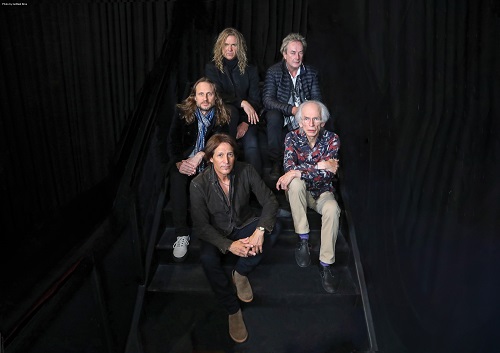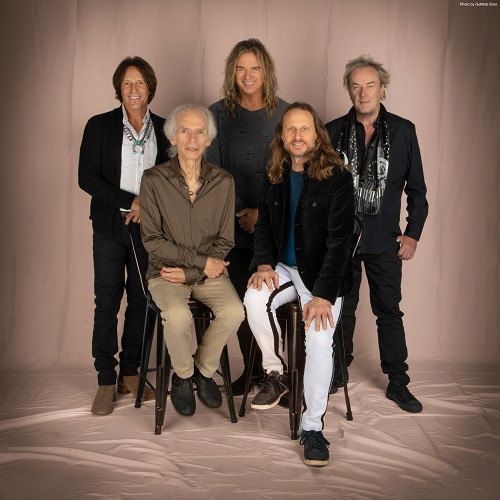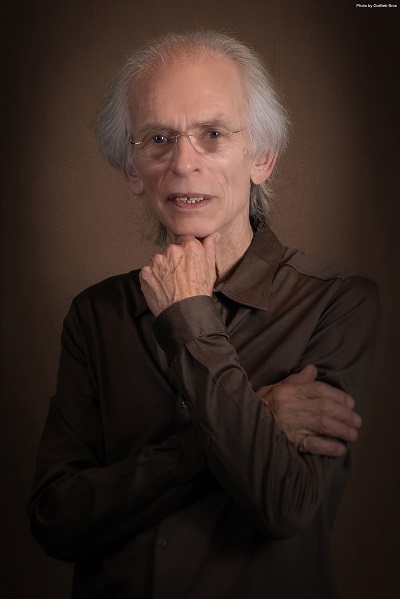By Shawn Perry
At 76, Steve Howe is at a unique juncture. There’s little question that he’s a world-class guitarist, as well as an early architect of what became known as progressive rock. Today, he’s the undisputed leader of Yes, a band he joined in 1970, left in 1981 and returned to in 1995. It’s an odd twist when you consider several former members, including three of the five originals, are all still alive.
The tale of two bands called Yes after founding bassist Chris Squire passed away in 2014 would probably make an intriguing multi-episode series on Netflix. For the fans, it was the best of both worlds. In one corner, you had a new Yes with Jon Anderson, Trevor Rabin and Rick Wakeman, aka ARW, forming in 2016. It not only featured an original member; it also included their most beloved and prolific keyboardist, along with the band’s third guitarist who was pivotal in keeping Yes fresh and popular throughout the 1980s.
Meanwhile, in the other corner, there was the ongoing Yes with Howe and drummer Alan White. Together with Squire, they’d already established their own annual sea cruise and played their classic albums in their entirety at their concerts. They carried on with Billy Sherwood, personally groomed by Squire himself, to take the late bassist’s place. To celebrate the group’s 50th anniversary, they invited original keyboardist Tony Kaye to sit in at a few shows. Things were about to get intense between the two Yes camps. Then the pandemic came along, and all bets were off.

Once things started to get back to normal, Anderson and Wakeman returned to their solo careers as whispers of another round of ARW began to fade. Howe shifted into overdrive and decided to take Yes back into the studio for a new album. Released in 2021, The Quest is the first Yes album without Squire, which also makes it the first without any original members. It’s also the first with Howe in the producer’s chair, and the last with White, who passed away six months after its release. Those are the stats if you’re keeping score.
According to Howe, the synergy of the experience carried over to a second record that would become Mirror To The Sky. “When we finished The Quest, we had two tracks left, two 10-minute tracks that became ‘Mirror To The Sky’ and ‘Luminosity.’ We didn’t need to work through all the music for The Quest because we satisfied the crest, if you like, at that point, and we had those two tracks. So it was terrific being able to kick into gear and just roll onto another record.”
The guitarist says that because of the pandemic, writing and recording was something that he and the rest of the band were able to spend a little more time on. “It appeared to be the most unwanted thing in the world,” he told me. “And then suddenly we turned it around in places to make it something that was an opportunity. I’ve been running wild for about 10 years doing touring as the most predominant factor. And, in the last three years, it’s been recording and writing, which has been very nice.”
The band did some touring in 2022, playing America, Japan and The UK. Like everyone, they adhered to the new protocols of the concert business (though, as Howe would explain, he didn’t appreciate having to wait to gain entrance into Nashville’s Ryman Auditorium to play a show because his name wasn’t on the list) At press time, Yes have no dates on the board for 2023. Shows previously scheduled for the UK and Europe were canceled due to business issues and unforeseen circumstances.
The album series that was supposed to feature Relayer may never see the light of day as the planned Classic Tales of Yes Tour 2024 will feature Yes standards, plus a song or two from Mirror To The Sky — though Howe wouldn’t reveal which ones. Nevertheless, he’s hoping Yes can make it over to the States before that, but he couldn’t say when.
Meanwhile, Mirror To The Sky is already receiving high marks from fans and critics. Like The Quest, Howe and Downes recorded their parts in England, while Sherwood, singer Jon Davidson and new drummer Jay Schellen set up shop in California. Sherwood and Davidson share many of the songwriting credits with Howe, though the guitarist reminds me he wrote the three bonus tracks that fill the album’s second disc.
“There’s a lot of my writing,” he confirms, “but Jon and Billy have been in a good place. We’ve all got our own way of writing. What happens is when we put those two or three ideas into place, we’re coming up with a nice style of Yes music which covers my approach to the melodic kind of side and Jon’s lyrical side. I’m writing a lot of lyrics too, but Jon is holding down the fort with some really nice lyrics. And Billy’s writing a lot of great music.”
Keyboardist Geoff Downes, normally a prolific writer, only co-wrote one song, “Living Out Their Dream” with Howe, who, uncharacteristically, also sings the song’s lead vocal alongside Davison (they also “duet” on “Magic Potion”). The guitarist mentions that Downes did a lot of writing on The Quest but wasn’t as involved with Mirror To The Sky. “Maybe next time,” he offers, meaning that there’s still more Yes music to come.
Together, The Quest and Mirror To The Sky represent a new era of Yes. Howe’s guitar work is at its core, with tighter, smoother arrangements, bits and pieces of orchestration weaved into the music, yet clearly cast in a Yes dye. Davison is reminiscent of his predecessors, but he comes across as more assured and confident in his own voice. Downes keeps the keys on the straight and narrow, while Sherwood’s bass work retains that Chris Squire growl. Schellen, making his first appearance as an official member on Mirror To The Sky, stays in the pocket and keeps the flow moving forward. “He knows what to play,” is the way Howe describes it.
Some speculate the music is a little lighter, perhaps not as punchy and full of fire as it has been in the past. Is it fair to compare the current crop of Yes music to Fragile and Close To The Edge? Probably not because the members of the band were younger and more eager to make an impression. Things were also a little more democratic.

Under Howe’s tutelage, Yes operates within different parameters. Although working and recording remotely is more economical and practical, it’s also a solitary practice that requires patience, discipline, and instinct. Then you must consider that Howe is not only writing, playing and singing on Yes records: he’s also producing them. Considering the range of noted producers who have curated Yes albums — from Eddy Offord, to Trevor Horn, to Roy Thomas Baker — how the task fell to the guitarist is both obvious and sound. Did he draw inspiration from working with other producers? Or is producing simply a natural extension of being a musician and working in studios?
“Both really,” Howe replies. “I always thought that there was a bit more to being in a band or being a musician than just playing and letting somebody else decide how that develops. I’ve always been part of the team that did that with Yes. When we did it in collaboration with the producer, there was a lot to learn. I’ve been learning from producers since 1964 when I made Maybelline’ (the Chuck Berry song covered by the Syndicats) with Joe Meek.
“Producers always interested me,” he adds. “These kind of backroom guys who you didn’t really know what they did. They did something the others couldn’t do. I learned the tools of the trade over the years and I really felt that unless somebody inside the band was going to produce, it would go astray. Somebody would take it somewhere they wanted to go. But the band knows where to take the music. So, it was quite logical that I would step into that chair. Basically, I presented a concept, which is really natural. It wasn’t reinventing the wheel. I got a general plan for The Quest, and we drifted into exactly the same thing on Mirror To The Sky, where they had gained the confidence in me now. They let me double a lot and rearrange things a lot. For the most part, there has to be something that they’re doing that turns me on. And that’s what we found.”
Howe is quick to credit Sherwood — himself a notable producer as well as a previous Yes member briefly in the 1990s who has since collaborated with nearly all other members of the band, past and present — in helping to preserve the band’s signature style. “Billy is a great designer and has a lot to do with helping it sound like a Yes bass and drums because he knows what that kind of thing is. He’s very tuned into what Chris was.”

For Steve Howe, the work never stops. While he promotes Mirror To The Sky and assesses touring options for the band, he always busies himself with side and solo ventures. “Recording music is always going on,” he notes. “I’ve got projects. I’ve also been working on some solo projects, which will evolve.”
As a follow-up to 2008’s Motif, Vol. 1, which comprises 20 re-recordings of earlier guitar instrumental pieces, Howe is putting together Motif, Vol. 2, which he describes as “the completion of the cycle,” adding that this work is “very important” and “close to my heart.” Although he doesn’t have a release date just yet, he said the collection is complete and ready for public consumption.
Instead of finishing off our chat with questions about reunions or associations with former Yes members, I ask Howe where he sees the band at this point in their storied, often rocky run. “I’ve been through a lot of them,” he responds with a laugh. “The 70s was a decade with them, and then ‘95 onwards. It’s really a very different creature, but it always was very important that the people in it got on and played well on stage. In fact, it was almost more important to play well on stage than get on.” After more laughter, he adds, “You can see the paradox of that. Even if we weren’t getting on, we’d still play very well. So that was sort of like a mixed criteria there — a goal to play well. Those years were actually very difficult internally. And so was Union and Keys To Ascension. As you plow through it, it is years of difficult ways of working, difficult personalities, difficult resolutions, difficult finances, everything was difficult.
“Since 2008, when Chris, Alan and I started the band again with Benoit David and Oliver Wakeman, it’s changed a great deal. And it’s morphed into a very streamlined, really efficient, happy outfit called Yes. We are happy guys, we are having a nice time, and we are really loving our creativity that we can bring to our music because of the collaborations. This is a very heavenly Yes.”
So there you have it: Steve Howe helming a “happy,” “heavenly,” possibly final edition of Yes. Or could it be? Could Arc of Life, the other band Davison, Sherwood, and Schellen have, become the new Yes someday? Or could technology keep Yes around forever?
We didn’t get it into any of that. When you start whittling away at the necessary personnel to deliver the real deal, things can get dicey. Safe to say, as long as Steve Howe is on board, this version of Yes is very much the real deal.





















